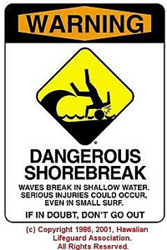|
The shimmering turquoise waters in the tropical postcard of the Hawaiian Seashore is always invitingly picture
perfect. In reality Hawaii is the most isolated land mass in the world- in the
middle of the Pacific Ocean with seasonal storms and swells that bring rapidly
changing ocean conditions even on sunny days. On the average, 12 people drown
each year on Kauai alone. Often the victems are strong swimmers who underestimate
the power of the local ocean current. Use caution and common sense to prevent
tragedy.
There are many safe places to enjoy the ocean in Hawaii. The life guarded beaches
of Waikiki, Oahu, the shallow sandy waters of Kihei, Maui and the reef sheltered
bays of South Kauai are generally safe spots for casual swimmers to enjoy the
pleasures of ocean swimming and frolicking.
Use wisdom in choosing time and
place before jumping into the Hawaiian waters. Never depend on floatation devices.
Be wary of river mouths and swimming in shoreline adjacent to urban areas after
heavy rains. Talk to local surfers and life guards before getting in the water.
BASIC OCEAN SAFETY TIPS:
* NEVER turn your back on the ocean!
* Swim at beaches WITH lifeguards
* CHECK with lifeguards for conditions
* BUDDY UP, don't swim alone
* READ and OBSERVE posted sign warnings
* WATCH children carefully and HOLD on to the younger ones. Do not depend on
LifeGuards to watch young children.
* NEVER attempt to swim at the water's edge during big surf.
* BEWARE River Mouths can be deadly with strong current especially after afternoon
or seasonal rainfall.
* WATCH the surf for at least 15 minutes before entering the water.
* NEVER rely on your board or leash as a substitute for swimming ability.
* NEVER surf or bodyboard in big waves unless you are an expert.
* NEVER swim in big surf if you are not a strong swimmer.
* DO NOT surf or swim in murky water or muddy river mouths
* DON'T drink alcohol or do drugs and swim
* Be PREPARED for a wipeout!
* IF IN DOUBT, DON'T GO OUT!
|

















